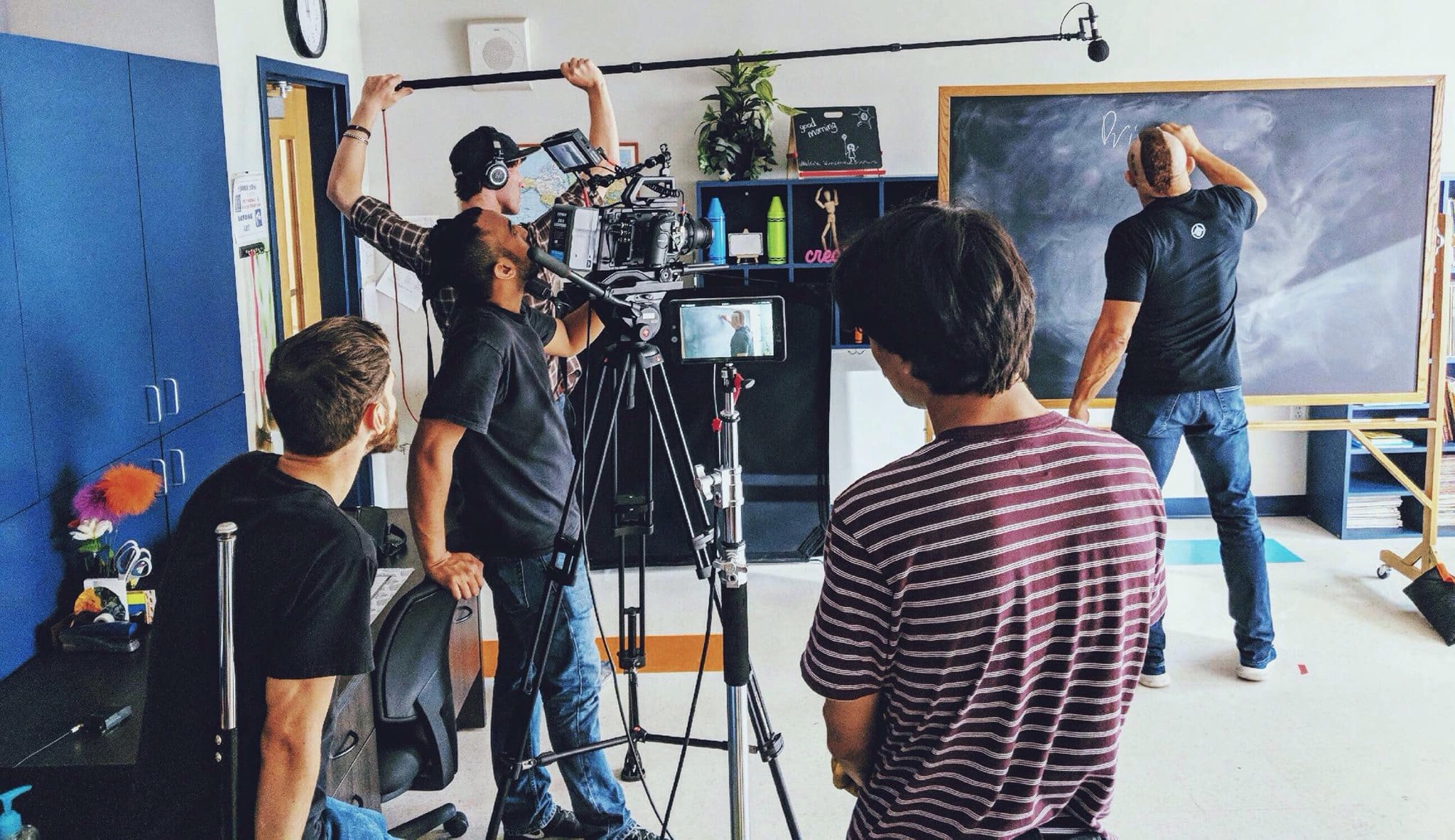The demand for high-quality video content has exploded across Australia’s digital landscape, from social media marketing and corporate communications to wedding documentation and creative storytelling. For visual creators seeking to master moving image production, a comprehensive videography course provides essential training in the technical, creative, and business skills needed to succeed in this dynamic field.

The Revolution of Online Video Education
Learning online has transformed videography education, making professional video production training accessible to students across Australia’s vast continent. Whether you’re studying in tech-savvy Brisbane, creative Adelaide, or remote regional areas, an online videography course provides convenient access to comprehensive videography instruction that accommodates diverse schedules and learning preferences.
The advantages of online videography education include:
- Comprehensive skill integration: Combine camera operation, editing, storytelling, and business development in one program
- Industry-current curriculum: Regular updates reflecting rapidly evolving video technology and platforms
- Flexible learning schedule: Study during evenings, weekends, or between other commitments
- Cost-effective access: Professional video training without expensive equipment purchases or studio rentals
- Global perspective: Learn from successful videographers worldwide while understanding Australian market dynamics
Technical Foundations of Video Production
A comprehensive videography course must establish strong technical foundations that enable professional-quality video production across diverse shooting conditions and client requirements. Learning online allows for detailed exploration of video-specific techniques through interactive demonstrations, equipment comparisons, and hands-on exercises that reinforce technical learning.

Camera Operation for Video: Video production requires different camera skills than still photography, involving continuous recording, movement coordination, and real-time exposure management. Online courses provide extensive training in video camera settings, frame rate selection, resolution optimization, and recording format choices that affect post-production workflows and final output quality.
Students learn stabilization techniques, smooth camera movement methods, and handheld shooting strategies that create professional-looking footage without expensive equipment. Focus pulling, exposure adjustment during recording, and audio monitoring receive detailed coverage as essential real-time video skills.
Video-Specific Equipment: Videography requires specialized equipment considerations beyond still photography gear. Online courses explore video-optimized cameras, lens selection for video work, audio recording equipment, and stabilization systems that support professional video production.
Budget-conscious equipment recommendations help students build capable video production setups without overwhelming initial investments. Equipment rental strategies and upgrade pathways provide guidance for accessing professional-level gear as projects and budgets allow.
Audio Production Excellence: High-quality audio is crucial for professional video production, often more important than perfect visual quality. Online courses provide comprehensive audio training covering microphone selection, recording techniques, and audio post-production that ensures broadcast-quality sound accompanying visual content.
Students learn to work with lavalier microphones, shotgun microphones, wireless systems, and audio interfaces that capture clean dialogue and environmental sound. Audio troubleshooting techniques help identify and resolve common sound problems during production and post-production phases.

Creative Development and Storytelling
Visual Storytelling Principles: Effective videography requires strong storytelling abilities that engage audiences and communicate messages clearly through moving images. Online courses explore narrative structure, visual storytelling techniques, and emotional pacing that create compelling video content across different genres and applications.
Students learn to develop story outlines, create shot lists, and plan visual sequences that support narrative goals while maintaining audience engagement. Documentary storytelling, commercial narrative techniques, and social media content creation receive specialized coverage addressing different storytelling requirements.
Cinematography and Visual Aesthetics: Professional videography requires sophisticated understanding of visual composition, lighting for video, and cinematographic techniques that create polished, engaging content. Online videography courses teach moving image composition, camera movement integration, and visual style development that differentiates professional work from amateur efforts.
Color theory for video, lighting continuity, and visual consistency across long-form projects receive detailed attention as essential elements of professional video production. Students learn to develop signature visual styles that enhance their work’s recognizability and market appeal.
Editing and Post-Production: Video editing transforms raw footage into polished final products, requiring technical proficiency and creative judgment that serve story goals while maintaining audience engagement. Online courses provide comprehensive editing training covering software selection, workflow development, and advanced editing techniques that create professional results.
Students learn color correction, audio synchronization, transition techniques, and effects application that enhance rather than distract from story content. Export optimization for different platforms and viewing devices receives coverage as essential technical knowledge for modern video distribution.
Genre-Specific Applications
Wedding and Event Videography: Wedding videography represents a significant market opportunity in Australia, requiring specialized skills in event coverage, family dynamics management, and emotional storytelling under pressure. Online videography courses provide comprehensive wedding videography training covering timeline coordination, ceremony filming protocols, and reception documentation techniques.
Business development specific to wedding videography includes booking procedures, client consultation processes, and service package development that appeals to engaged couples while ensuring profitable operations. Students learn to work collaboratively with photographers, wedding planners, and venue staff for seamless event documentation.

Corporate Video Production: Corporate videography encompasses diverse applications from training videos and promotional content to executive interviews and event documentation. Online courses explore corporate video requirements, professional communication standards, and business-focused content creation that supports organizational objectives.
Students learn to work with corporate clients, understand brand guidelines, and create content that aligns with professional communication standards while maintaining creative quality and visual interest.
Content Creation for Digital Platforms: Social media and digital marketing have created enormous demand for short-form video content optimized for specific platforms and audience behaviours. Online courses teach platform-specific video creation for Instagram, TikTok, YouTube, and LinkedIn, understanding how different platforms affect content strategy and production techniques.
Viral content analysis, trending topic integration, and audience engagement strategies help students create content that performs well on social media platforms while building personal or client brands effectively.
Business Development and Entrepreneurship
Videography Business Foundations: Successful videography businesses require solid business foundations that support creative work while ensuring financial sustainability. Online courses provide comprehensive business training covering legal structures, insurance requirements, and operational systems specific to video production businesses.
Pricing strategies for video work present unique challenges given the time-intensive nature of video production and post-production. Students learn cost calculation methods, project estimation techniques, and value-based pricing strategies that ensure profitability while remaining competitive in Australian markets.
Client Acquisition and Retention: Video production businesses depend on consistent client acquisition and strong referral networks for sustainable growth. Online courses teach marketing strategies specific to video services, portfolio development techniques, and networking approaches that build robust client pipelines.
Students learn to develop service packages that appeal to different client types, create compelling demo reels that showcase capabilities effectively, and manage client relationships that encourage repeat business and referral generation.
Project Management for Video Production: Video projects involve complex coordination of pre-production planning, production logistics, and post-production workflows that require systematic project management for successful completion. Online courses provide training in project planning, timeline development, and client communication that ensures smooth project delivery.
Students learn to manage multiple projects simultaneously, coordinate with team members and clients, and handle common production challenges that arise during video creation processes.

Technology Integration and Workflow Optimization
Modern Video Technology: Video production technology evolves rapidly, requiring creators to stay current with camera developments, software advances, and distribution platform requirements. Online courses provide frameworks for evaluating new technology and making strategic adoption decisions that enhance productivity without unnecessary complexity.
Cloud-based workflows, collaborative editing systems, and remote production techniques receive coverage as modern solutions that enable flexible working arrangements and team collaboration across geographic distances.
Efficient Production Workflows: Professional video production requires systematic approaches to common tasks that maximize efficiency while maintaining quality standards. Online courses teach workflow development, template creation, and automation strategies that streamline production processes.
Students learn to develop standard operating procedures for different project types, implement quality control measures, and optimize editing workflows that reduce post-production time while ensuring consistent results.
Specialization and Advanced Techniques
Documentary Production: Documentary videography requires specialized skills in research, interview techniques, and long-form storytelling that differ significantly from commercial video production. Online courses explore documentary production methods, ethical considerations, and distribution strategies for factual content creation.
Students learn interview setup techniques, research methodologies, and story structure development that supports compelling documentary storytelling while maintaining journalistic integrity and ethical standards.
Commercial and Advertising Video: Commercial video production involves working with creative briefs, brand guidelines, and marketing objectives that guide creative decisions. Online courses provide training in commercial production processes, client collaboration techniques, and creative problem-solving that delivers effective marketing content.
Students learn to interpret creative briefs effectively, work with art directors and marketing teams, and deliver content that meets specific business objectives while maintaining creative quality and visual appeal.

Integration with Photography Skills
Multi-Media Content Creation: Many content creators combine videography skills with still photography expertise, offering comprehensive visual media services to clients. Online courses explore how photography skills translate to video work, identify complementary techniques, and develop integrated service offerings that leverage both skill sets.
Students learn to adapt lighting techniques, composition principles, and client interaction skills across both media types, creating cohesive visual branding that works effectively in still and moving image formats.
Hybrid Event Coverage: Event coverage increasingly involves both photography and videography services, requiring creators who can work effectively in both mediums simultaneously or coordinate with team members for comprehensive coverage.
Equipment and Technology Considerations
Camera Selection for Video: Video production cameras range from smartphone devices to professional cinema cameras, each offering different capabilities and limitations. Online courses provide guidance on camera selection based on project requirements, budget constraints, and intended distribution platforms.
Students learn to evaluate camera specifications that matter for video work, understand recording format implications, and make informed equipment decisions that support their specific production needs and business goals.
Audio Equipment Integration: Professional video production requires sophisticated audio equipment that captures high-quality sound in various recording environments. Online courses explore microphone types, audio recorder selection, and signal processing equipment that ensures broadcast-quality audio accompanying video content.
Students learn audio equipment setup procedures, troubleshooting techniques, and post-production audio processing that creates polished final products meeting professional standards.

Distribution and Marketing
Platform Optimization: Different video platforms have specific technical requirements, audience behaviors, and algorithm preferences that affect content performance. Online digital marketing courses teach platform-specific optimization techniques, metadata strategies, and content adaptation methods that maximize reach and engagement across different distribution channels.
Students learn YouTube optimization, social media platform differences, and website integration techniques that ensure video content performs effectively regardless of viewing platform or device type.
Video Marketing Strategies: Video content requires strategic marketing approaches that build audiences, encourage sharing, and drive desired actions from viewers. Online courses explore video marketing techniques, audience development strategies, and conversion optimization that transforms video content into business results.
Future Trends and Emerging Technologies
Virtual and Augmented Reality: Emerging technologies like VR and AR create new opportunities for video creators willing to adapt skills to immersive content creation. Online courses introduce these technologies, explore production differences, and discuss market opportunities for creators interested in cutting-edge video production.
Artificial Intelligence Integration: AI tools increasingly support video production processes from automated editing assistance to content optimization. Online courses explore AI integration strategies that enhance productivity while maintaining creative control and personal artistic vision.
Conclusion
A comprehensive videography course delivered through online course platforms provides visual creators with integrated training in technical mastery, creative development, and business skills essential for video production success. The convenient nature of learning online makes specialized videography education accessible to students across Australia while maintaining flexibility around personal and professional commitments.
Online videography education combines technical skill development with creative training, business knowledge, and industry insights necessary for building successful video production careers. Students gain both artistic abilities and entrepreneurial skills required for thriving in Australia’s growing video content market.
For creators passionate about moving image storytelling and visual communication, comprehensive online training provides flexible, thorough preparation that addresses both creative and business aspects of videography careers.
Whether seeking to establish specialized video production businesses, expand existing photography services with videography offerings, or develop content creation skills for digital marketing, videography education provides the foundation for success in Australia’s dynamic visual media industry. The integration of technical training with creative development ensures students are prepared for the diverse opportunities and challenges in professional video production.




